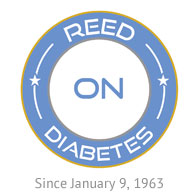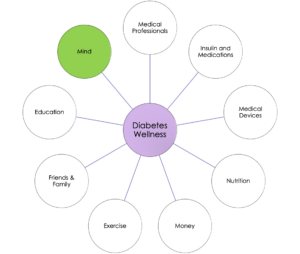This is the seventh post reviewing a spoke, or Cluster of Help, in the Diabetes Wellness Wheel. Below is the wheel with my standards, 2022 assessment, and adjustments for 2023 for Mindset.

Diabetes Wellness Wheel
Mindset can be a difference maker … especially when living with type 1.
Is the glass half full or half empty? The choice is ours.
Our mind works through our physical brain, which requires two essential nutrients: oxygen and glucose. When one of them goes awry, the brain doesn’t function at 100%. That’s why the thought process for type 1s may slow down temporarily with low blood sugar.
In addition to blood sugar swings, living with diabetes means choices … what to eat, how much insulin, what technology to use, when to exercise, and how to pay for the costs of diabetes. Those decisions can lead to a variety of thoughts and feelings. There’s much written about the mental demands created when living with diabetes.
But can choices in diabetes help manage our minds? If we learn to manage our minds, feelings of stress and anxiety can work for us instead of against us.
The good news is that our minds can be trained. Anxiety and negative thinking have gotten the best of me at times in my life. As a result, I’ve spent years searching, reading (*), and reflecting to find peace in my life with diabetes. While I’ve progressed over the past decade, I’m still a work in progress!
(*) Those influencing me include Vernon Howard, Mark Williams, George Mumford, Naval Ravikant, and the Farnum Street blog.
Standards
Acceptance
Accepting – and even embracing – life with type 1 diabetes. A moment that captured me was at a JDRF Gala in Omaha when Eric Paslay, a country music singer, said that he loves his life with diabetes.
Daily Self Care
Committing to daily self-care activities that include morning exercises (flexibility, balance, stretching, and breathing), meditation, mindful moments observed and detected by body senses, prayer, and gratitude.
Journaling
Writing a narrative for each of the daily self-care items.
Outlets
Music, exercise, and reading focus our minds on things we enjoy. These releases help us connect – or reconnect – with a good mood and positive outlook.
Alcohol, Nicotine, & Dependencies
Limiting consumption of addictive drugs and alcohol. Although they may provide immediate relief from stress, they can become addictive with harmful effects, including mental illness.
Removing Self Judgment
A certain amount of judgment can protect us from harmful situations. But continued self-judgment of diabetes results is a losing proposition, resulting in negative thoughts and esteem.
Professional Help
We need help when the demands of managing diabetes are more than we can handle. Usually, this means our endocrinology practice or friends and family, but there are times when someone with skills, education, and experience in mental health is needed.
2022 Narrative & Assessment (Score: 3 of 5; 5 = high)
- Acceptance: All good here. Being diagnosed at age 3, diabetes was with me from my first memories. As a young adult, I reached a point of frustration where I embraced finding the best ways to live with the Big D. That continues!
- Daily Self-Care: Each morning after showering, I take 10-15 minutes for exercises that work balance, flexibility, core, and breathing. It’s a fantastic way to get centered and start the day. In 2022, I did not do daily meditations and need to find 10-20 minutes each day for these. As for daily prayer, Kendra and I do these before dinner most nights, but I need to improve my prayer practice.
- Journaling: Daily, I write my self-care activities down on a weekly planner for accountability and reflection. I often reflect on the daily gratitude moments to lift me up when I’m down.
- Outlets: I love to exercise and usually feel positive and a sense of accomplishment afterward. I enjoy music and increasingly find myself relaxed by listening to podcasts. In 2022, I did not read much; this is an improvement area.
- Dependencies: I’ve turned to Diet sodas and alcohol to help with stress throughout my adult life. In 2022, alcohol continued to be something I looked forward to each day. I rarely consumed more than two drinks a day, but I didn’t like being dependent on it.
- Removing Judgment: My diabetes results have been judged by medical professionals, family, and me for decades. It’s one of my worst practices living with diabetes and continues as an improvement area.
- Professional Help: I didn’t need this in 2022, but I did in 2021. The Covid environment became too stressful, and I sought professional help. I learned several things about the human thought process. My negative thoughts started at night and served as a baseline for the next day. By recognizing that, I was able to observe and stop them. (It’s truly amazing how much creative fiction was in those ideas!) As a result, my nights and days are now more positive.
2023 Adjustments
I’ve made progress with my mindset over the past decade and will continue with the standards that are working. Here are my adjustments for 2023:
- Mediation: 10 minutes daily (5x/week) using the guided meditations in the Mindfulness book by Mark Williams and Danny Penman.
- Expanding my personal prayer time.
- Reading: 25 pages a day (5x/week) … thank you Farnum Street! Plus, re-reading the back half of the Almanack of Naval Ravikant with attention to the Happiness Habits on pages 149-151.
- Alcohol: I now have five or fewer drinks per week due to learnings from a dry January this year.
- Self Judgment: to stop judging my diabetes results, especially blood sugars and the tech that delivers them. They will never be perfect. Replacing frustration when technology breaks with observation. Recognizing out-of-range blood sugars as numbers that can be managed and moved … without judgment.
*******************


